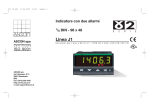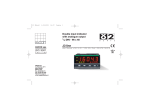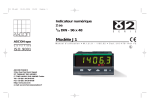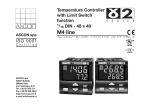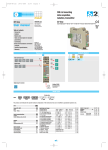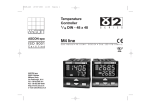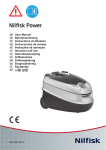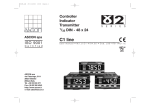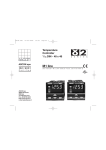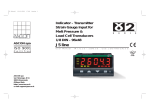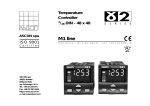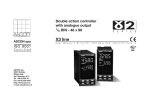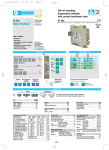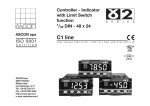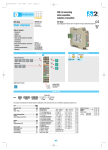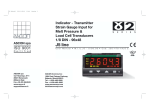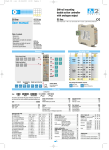Download J1 line
Transcript
J1 EN•ed1 2-03-2005 18:14 Pagina 1 Two alarms indicator 1/ 8 ASCON spa ISO 9001 C e r t i f i e d ASCON spa via Falzarego, 9/11 20021 Bollate (Milano) Italy Tel. +39 02 333 371 Fax +39 02 350 4243 http://www.ascon.it e-mail [email protected] DIN - 96 x 48 J1 line User c M a n u a l • M.I.U.J1 - 1/05.02 • Cod. J30-478-1AJ1 IE C UL LISTED US J1 EN•ed1 2-03-2005 18:14 Pagina 1 Two alarms indicator 1/ 8 DIN - 96 x 48 c J1 line C UL LISTED J1 1406. 3 1 2 US J1 EN•ed1 2-03-2005 18:14 Pagina 2 Information c NOTES ON ELECTRIC SAFETY AND ELECTROMAGNETIC COMPATIBILITY Please, read these instructions carefully before proceeding with the installation of the controller. Class II instrument, rearl panel mounting. This indicator has been designed in compliance with: Regulations on electrical apparatus (appliance, systems and installations) according to the European Community directive 73/23/EEC amended by the European Community directive 93/68/EEC and the Regulations on the essential protection requirements in electrical apparatus EN61010-1: 93 + A2:95. Regulations on Electromagnetic Compatibility according to the European Community directive #89/336/EEC, amended by the European Community directive #92/31/EEC, 93/68/EEC, 98/13/EEC and the following regulations: Regulations on RF emissions EN61000-6-3: 2001 residential environments EN61000-6-4: 2001 industrial environments Regulation on RF immunity EN61000-6-2: 2001 industrial equipment and system It is important to understand that it’s the responsibility of the installer to ensure compliance with the regulations on safety requirements and EMC. The device has no user serviceable parts and requires special equipment and specialised engineers. Therefore, a repair cannot be carried out directly by the user. For service or repair, contact the manufacturer or your sales represenattive. All the information and warnings about safety and electromagnetic compatibility are marked with the B sign, at the side of the note. 2 J1 EN•ed1 2-03-2005 18:14 Pagina 3 Table of contents TABLE OF CONTENTS Operating mode Resources Alarms Main universal input J1 OP1 12 IN OP2 Special functions (option) NO/NC OP1 OP2 1 2 3 4 5 6 7 INSTALLATION ...................................................Page ELECTRICAL CONNECTIONS .............Page PRODUCT CODING ......................................Page OPERATIONS ......................................................Page DISPLAYS ...............................................................Page COMMANDS ........................................................Page TECHNICAL SPECIFICATIONS ...........Page 4 8 14 18 28 29 31 Modbus RS485 Parameterisation Supervision (option) 3 J1 EN•ed1 2-03-2005 18:14 Pagina 4 1- Installation 1 INSTALLATION 1.1 GENERAL DESCRIPTION Installation must only be carried out by qualified personnel. Before proceeding with the installation of this indicator follow the instructions illustrated in this manual with particular attention to the installation precautions marked with the B symbol, related to the European Community directive on electrical protection and electromagnetic compatibility. Mounting clamps Product code label Panel surface IP 20 Terminal block EN61010 - 1 (IEC1010 - 1) B To prevent hands or metal touching parts that may be electrically live, the indicators must be installed in an enclosure. Sealing front panel gasket Front panel IP65 protection EN 650529 (IEC 529) 4 J1 EN•ed1 2-03-2005 18:14 Pagina 5 1- Installation 1.2 DIMENSIONAL DETAILS 1.3 PANEL CUT-OUT 92+0.8 mm 3.62+0.031 in 10 mm max. 0.39 in max. 96 mm 3.78 in 45+0.6mm 1.78+0.023in 48 mm 1.89 in 65mm min. 2.56 in min. 10 mm max. 0.39 in max. 113 mm min. 4.45 in min. 110 mm 4.33 in 5 J1 EN•ed1 2-03-2005 18:14 Pagina 6 1 - Installation B 1.4 ENVIRONMENTAL CONDITIONS Operating conditions M T %Rh Altitude up to 2000 m Temperature 0…50°C Relative humidity 5…95 % non-condensing Suggestions Special conditions M T %Rh P Altitude > 2000 m Temperature >50°C Humidity > 95 % Conducting atmosphere Forbidden Conditions C E 6 D Corrosive atmosphere Explosive atmosphere Use 24Vac supply version Use forced air ventilation Warm up Use filter J1 EN•ed1 2-03-2005 18:14 Pagina 7 1- Installation 1.5 PANEL MOUNTING [1] 1.5.1 INSERT THE INSTRUMENT 1.5.2 INSTALLATION SECURING 1.5.3 CLAMPS REMOVING 1.5.4 INSTRUMENT UNPLUGGING 1 Prepare panel cut-out 2 Check-front panel gasket position 3 Insert the instrument through the cut-out 1 Fit the mounting clamps as shown 2 Push the mounting clamps towards the panel surface to secure the instrument 1 Insert the screwdriver in the clips of the clamps 2 Rotate the screwdriver 1 Push and 2 Pull forward to remove the instrument 1 1 B 1 2 2 1 2 1 3 2 2 UL note [1] For Use on a Flat Surface of a Type 2 and Type 3 ‘raintight’ Enclosure. 1 Electrostatic discharges can damage the instrument Before removing the instrument the operator must discharge 1MΩ himself to ground 7 J1 EN•ed1 2-03-2005 18:14 Pagina 8 2 - Electrical connections 2 ELECTRICAL CONNECTIONS RS485 25 1 13 N/C 25 L 2 14 N/C 26 N C 3 15 N/C 27 N/C 4 16 N/C 28 NC N/C 5 17 N/C 29 C N/C 6 18 N/C N/C 7 19 N/C 30 NO 31 NO N/C 8 20 N/C 32 C 21 N/C 33 N/C 22 N/C 34 N/C 23 N/C 35 N/C 24 N/C 36 N/C 9 10 mV TC 11 12 A b B RTD B 2.1 TERMINAL BLOCK [1] 26 27 28 29 30 31 32 36 Rear terminal cover 5.7 mm 0.22 in OP1 0,5 Nm OP2 1 2 10 3 12 Wire size 1 mm2 (18 AWG Solid/Stranded) 24V— OUT 15 screw terminals M3 Terminals Pin connector q 1.4 mm 0.055 in max. Option terminals Tightening torque 0.5 Nm Ø Positive screw-driver PH1 UL note [1] Use 60/70 °C copper (Cu) conductor only. 8 11 Negative screw-driver 0,8 x 4 mm L Fork-shape AMP 165004 Ø 5.5 mm - 0.21 in Stripped wire L 5.5 mm - 0.21 in J1 EN•ed1 2-03-2005 18:14 Pagina 9 2 - Electrical connections B PRECAUTIONS Despite the fact that the instrument has been designed to work in a harsh and noisy environment (level IV of the industrial standard IEC 801-4), it is recommended these following suggestions. A All the wiring must comply with the local regulations. The supply wiring should be routed away from the power cables. Avoid using electromagnetic contactors, power Relays and high power motors nearby. Avoid power units nearby, especially if controlled in phase angle mode. Conduit for supply and output cables A 25 B 26 27 28 A 29 30 31 32 33 36 25 2 3 D A= B= C= D= B 26 27 0,5 Nm 1 Keep the low level sensor input wires away from the power lines and the output wires. If this is not feasible, use shielded cables on the sensor input, with the shield connected to ground. B 2.2 SUGGESTED WIRE ROUTING 28 29 30 Supply Outputs Analogue inputs Serial Communications 31 32 33 36 0,5 Nm 10 11 12 C 1 2 3 D 10 11 12 C Conduit for low level sensor cables 9 J1 EN•ed1 2-03-2005 18:14 Pagina 10 2 - Electrical connections B 2.3 EXAMPLE OF WIRING DIAGRAM Supervision V~ [3] RS485 1 PTC 2 25 26 3 C 27 OP1 Alarm 28 29 30 OP2 [6] [5] [5] 31 [6] 32 [5] IN1 PT100 A b B 10 10 11 12 Power supply switch Notes: 1] Make sure that the power supply voltage is the same as indicated on the instrument. 2] Switch on the power supply only after all the electrical connections have been completed. 3] In accordance with safety regulations, install a circuit breaker on the instrument power supply line that is clearly identified with that instrument (or group of instruments). The breaker shall be easily accessible by the operator. 4] The instrument is PTC protected. In case of failure it is suggested to return the instrument to the manufacturer for repair. 5] To protect the instrument internal circuits use: - 2 AT fuse for Relay outputs (220 Vac); - 4 AT fuse for Relay outputs (110 Vac). 6] Relay contacts are already protected with varistors. Only in case of 24 Vac inductive loads, use model A51-065-30D7 varistors (on request) J1 EN•ed1 2-03-2005 18:14 Pagina 11 2 - Electrical connections 2.3.1 POWER SUPPLY B Switching power supply with multiple isolation and internal PTC • Standard version: nominal voltage: 100...240Vac (-15...+10%) Frequency 50/60Hz • Low Voltage version: Nominal voltage: 24Vac (-25...+12%) Frequency 50/60Hz or 24Vdc (-15...+25%) Included PTC 25 L Supply 26 N 27 For better protection against electrical interference, it is recommended not to connect the ground clamp provided for civilian installations. B 2.3.2 MAIN UNIVERSAL INPUT A L-J-K-S-R-T-B-N-E-W thermocouple type • Connect the wires with the polarity as shown; • Always use compensation cable of the correct type for the thermocouple used; • The shield, if present, must be connected to a proper ground. 11 12 B For Pt100 resistance thermometer • If a 3 wire system is used, always use cables of the same diameter (1mm2 min.) (line 20 Ω/lead maximum resistance); • When using a 2 wires system, always use cables of the same size (1,5mm2 min.) and put a jumper between terminals 11 and 12. A b B C For ∆T (2x RTD Pt100) Special A When the distance between the indicator and the sensor is 15 m using a cable of 1.5 mm2 size produces an error on the measure of 1°C (1°F). A Wire resistance 150Ω max. 10 11 12 10 R1 R1 + R2 must be <320Ω B 11 R2 A For 3 wires only. Maximum line resistance: 20Ω/line 12 Use wires of the same length and 1.5 mm2 size. Maximum line resistance: 20Ω/line 11 J1 EN•ed1 2-03-2005 18:14 Pagina 12 2 - Electrical connections D 2.3.3 OP1 - OP2 For mA, mV B B 2.3.4 ALARM OUTPUTS mV mA 11 External shunt 2.5Ω OP1 output OP1 SPDT relay output 12 OP2 SPST-NO relay output 36 24Vdc OP1 relay output: • SPDT relay, 2A/250Vac for resistive load, fuse 2AT at 250Vac, (4A/120Vac, fuse 4AT at 120Vac). OP2 relay output: • SPST N.O. relay, 2A/250Vac for resistive load, fuse 2AT at 250Vac, (4A/120Vac, fuse 4AT at 120Vac). D1 With 2 wire transmitter 4…20mA mA External shunt 2.5Ω [1] 11 12 [1] 11 4…20mA 12 Note: [1] Auxiliary power supply for external transmitter 24Vdc ±20% /30mA max. with no short circuit protection 12 C Load [1] NO 30 Fuse OP2 output Fuse 31 Load [1] 36 24Vdc mA External shunt 2.5Ω Load Vac 29 32 D2 With 3 wire transmitter Transmitter PV Fuse 28 [1] Rj >10MΩ. Transducer NC Vac Notes: [1] Varistor for inductive load 24Vac only. J1 EN•ed1 2-03-2005 18:14 Pagina 13 2 - Electrical connections 2.3.5 SERIAL COMMUNICATIONS B (OPTION) 1 2 3 C • Galvanic isolation 500Vac/1 min. • Compliance to the EIA RS485 standard for Modbus/Jbus • Setting dip switches O N 1 2 3 4 A Please, read: “gammadue® and deltadue® indicator series serial communication and configuration software” technical manual 13 J1 EN•ed1 2-03-2005 18:14 Pagina 14 3 - Product coding 3 PRODUCT CODING The complete code is shown on the instrument label. Configuration code (software) The information about product coding is accessible from the front panel by means of the procedure described in section 5.2 page 28. Basic product code (hardware) O P Q R I L M N B C D Instrument label P/N : J1-3150-0000 CONF : S/N : A0A-0450/2210 V~(L-N) : 100÷240V 50/60 Hz - 4W J1 1406. 3 1 14 2 J1 EN•ed1 2-03-2005 18:14 Pagina 15 3 - Product coding 3.1 MODEL CODE The product code indicates the specific hardware configuration of the instrument that can be modified by authorized personnel only. Line Model: J 1 Basic Accessories A B C 0 - 0 F G 0 / Line Configuration 1st part 2nd part I L M N - O P 0 0 J 1 Power supply 100...240Vac (-15...+10%) 24Vac (-25...+12%) or 24Vdc (-15....+25%) A 3 5 Outputs OP1 - OP2 None Relay - Relay B 0 7 Serial Communications None RS485 Modbus/Jbus SLAVE C 0 5 User manual Italian/English (std) French/English German/English Spanish/English F 0 1 2 3 Front panel colour Dark (std) Beige G 0 1 15 J1 EN•ed1 2-03-2005 18:14 Pagina 16 3 - Product coding 3.2 CONFIGURATION CODING A 4+4 index code follows the model of the indicator. The code has to be set to configure the indicator (see chapter 3.1 page 15) A If, when the indicator is powered up for the first time, the display shows the following message J1 Conf 1 2 it means that the indicator has not yet been configured. The indicator remains in standby until the configuration code is set correctly (pag. 24). 16 Index 1st part of configuration code I L M N 0320 E.g. Enter the code 0320 to choose: - T/C type J input with range 0...600°C; - Change the display color to red when an alarm is active. Index 2nd part of configuration code O P Q R 2300 E.g. Enter the code 2300 to choose: - AL1 absolute, active high; - AL2 absolute, active low. Input type and range -99.9…300.0 °C -99.9…572.0 °F TR Pt100 IEC751 -200…600 °C -328…1112 °F TR Pt100 IEC751 32…1112 °F TC L Fe-Const DIN43710 0…600 °C 32…1112 °F TC J Fe-Cu45% Ni IEC584 0…600 °C -200 …400 °C -328…752 °F TC T Cu-CuNi 32…2192 °F TC K Chromel-Alumel IEC584 0…1200 °C 32…2912 °F TC S Pt10%Rh-Pt IEC584 0…1600 °C TC R Pt13%Rh-Pt IEC584 0…1600 °C 32…2912 °F TC B Pt30%Rh 0…1800 °C 32…3272 °F Pt6%Rh IEC584 TC N Nicrhosil-Nisil IEC584 0…1200 °C 32…2192 °F TC E Ni10%Cr-CuNi IEC584 0…600 °C 32…1112 °F TC NI-NiMo18% 0…1100 °C 32…2012 °F TC W3%Re-W25%Re 0…2000 °C 32…3632 °F TC W5%Re-W26%Re 0…2000 °C 32…3632 °F Dc input 0…50mV linear Engineering and units Dc input 10…50mV linear Engineering and units Custom input and range [1] I 0 0 0 0 0 0 0 0 L 0 1 2 3 4 5 6 7 0 8 0 1 1 1 1 1 1 1 9 0 1 2 3 4 5 6 [1] For instance, other thermocouples types, ∆T (with 2 PT 100), custom linearisation etc. J1 EN•ed1 2-03-2005 18:14 Pagina 17 3 - Product coding Display mode Green Red Red when alarm 1 (AL1) active M 0 1 2 Alarm type and function Non-active Sensor break alarm Absolute Deviation Band Rate alarm (AL1 only) Active High Active Low Active High Active Low Active Out Active In O P AL1 AL2 0 1 2 3 4 5 6 7 8 - 17 J1 EN•ed1 2-03-2005 18:14 Pagina 18 4 - Operation 4 OPERATIONS 4.1.1 KEY FUNCTIONS AND DISPLAY IN OPERATOR MODE Input value [1] In engineering uits Over range J1 8. 4 1. 8.0 8.6 8.3 8 1 2 _____ 88888 88888 ----Alarm status LEDs (reds) Å Ç Menu access 18 AL1 ON AL2 ON Alarm acknowledge Entry key for selection and value setting confirmation Min and Max. values display Note: [1] The color of the dislplay is set through field Configuration Code (page 17). Under range m of the J1 EN•ed1 2-03-2005 18:14 Pagina 19 4 - Operations 4.1.2 KEY FUNCTIONS AND DISPLAY IN PROGRAMMING MODE A J1 8. 8 . 8 . 8 . 8 The parameter setting procedure has a timeout. If no keys are pressed for, at least 30 seconds, the indicator switches back, automatically, to the operator mode. After having selected the parameter or the code, press $ and % to display or modify the value (see page 20). 1 Parameter Code/Value 2 Back to previous parameter Access to the menu for: Parameter setting Configuration Entry key for selection and value setting confirmation Value modification The value is entered when the next parameter is selected, by pressing the R key. Until the $ or % are pressed or if you wait for 30 seconds, the parameter value is not inserted. Pressing the í key, the next group of parameters is presented on the display. 19 J1 EN•ed1 2-03-2005 18:14 Pagina 20 4 - Operations 4.2 PARAMETER SETTING 4.2.1 NUMERIC ENTRY (i.e. how to the modify a threshold value from 275.0 to 240.0 ) Pressing $ or % momentarily changes the value by 1 unit every push. Continued pressing of $ or % changes the value, at a rate that doubles every second. Releasing the button decreases the rate of change. In any case value stops changing the max./min. value has reached limit set for the parameter. AL. sp AL.1sp 277. 0 Access the alarm threshold menu 4.2.2 MNEMONIC CODES SETTING Select the AL 1 threshold Press the $ or % to display the next or previous mnemonic for the selected parameter. Continued pressing of $ or % will display further mnemonics at a rate of one mnemonic every 0.5 s. The mnemonic displayed at the time the next parameter is selected is the one stored in the parameter. (e.g. configuration see page 30) Threshold value of AL1 alarm ————Decrease Unit Engineering Units °f °C Degree Centigrade none °f Degree Fahrenheit ph °C Degree Centigrade Degree Fahrenheit No unit defined 276. 0 ————Increase 274. 8 20 Operator mode Displays the value of the selected input 277. 0 Threshold entry Press the è key to store the new value in the instrument Ph J1 EN•ed1 2-03-2005 18:14 Pagina 21 4 - Operations 4.3 PARAMETERISATION - MAIN MENU 4.3.1 ALARM SET Operator mode 1274. 8 Direct access to the parameter (only if Code <5000) Al. SP AL sp Alarm set [1] (page 21) Password Entry pASS é AL. 1 sp é 0.5 Alarm parameter setting [1] (pag. 22) Code Back to the operator mode NO é 0 Instrument configuration (page 22) OK é AL2 alarm threshold 0.5 é AL2 hysteresis 0 YES Note: [1] The menu apears only if at least one of the alarms has been configured (except for the sensor break alarm). AL1 hysteresis AL. 2 sp AL. 2 hy Back to the operator mode AL1 alarm threshold AL. 1 hy Conf 5000 0 Al. p ar Only if Code value ≥5000 Must be equal to the value of the parameter Alarm threshold menu AL. r Ef Alarm internal reference value (engineering unit) Back to AL.1SP 21 J1 EN•ed1 2-03-2005 18:14 Pagina 22 4 - Operations 4.3.3 ALARMS PARAMETERISATION MENU AlPar Alarms parameterisation menu énone AL. 1 OP AL1 alarm output 4.3.5 CONFIGURATION MENU Note: [1] Only those alarms that are configured different than zero are shown during the parameterisation phase (fields op page 17). none/OpI /Op2/Op3/Op4 When an unconfigured indicator is powered up for the first time, the display shows: Conf See chapters 3, 3.1 and 3.2 starting from page 14. énone AL. 2 OP AL2 alarm output é é dir OP. 1 a AL1 alarm AL. 1 lb Latching/Blocking dir/reU none/ltch /bloc/ltbl é OP. 2 a AL2 alarm action dir/reU Back to AL.1Sr Configuration menu Con1 0 AL1 alarm action é dir 22 Conf none/OpI /Op2/Op3/Op4 0 AL. 2 lb AL2 alarm Latching/Blocking[1] none/ltch /bloc/ltbl Password Entry PASS Con2 Must be equal to the value of the parameter Back to the operator menu No Code Entering digits I - L - M - N of the configuration code (chapter 3.2 pages 15, 16) Entering digits O - P of the configuration code (chapter 3.2 pages 15, 16) énone Unit OK Yes Engineering units (see table 2) J1 EN•ed1 2-03-2005 18:14 Pagina 23 é 4 - Operations 0 é in. 1 dd LINEAR SCALE ONLY IN1 Low range =9999…32000 (min. 100 digit) é10000 é in. 1 Hi 0 t. f il1 é 0 in. 1 lo é N° of decimals 0…3 éj:bus Filter time constant OFF/1...30s 0 Prot in. 1 sh Communications protocol M.buS / jbuS é9600 Input shift OFF/-60...60 digit baud é IN1 High range =9999…32000 (min. 100 digit) SERIAL COM. OPTION (if installed) Baud rate 1200/2400 4800/9600 1 Addr Serial comms address 1...247 0 in. 1 Cn Square root input IN1 é é none/ sqrt 0 Cut1 Cut off IN1 square root value [1] 0…9.999 (engineering units) Password (password) 0…9999 factory default 33 33 Table 1 - Engineering units éunit Value Description °C Centigrade degrees °f Fahrenheit degrees none none mV mU Volt U mA mA Ampere A bar Bar psI PSI Rh rh pH ph Note: [1] Cut off the sqare root of the input value enables the user to round to zero a result that is too low to be meaningful. Code Back to the Con.1 parameter 23 J1 EN•ed1 2-03-2005 18:14 Pagina 24 4 - Operations 4.4 PARAMETERS DESCRIPTION For ease of operation of the indicator parameters have been organised in groups (menu), according to their functionality area. 24 4.4.1 ALARM THRESHOLD MENU AL1 alarm OP1 and OP2 outputs can be used as alarms threshold AL2 alarm it is possible to configure up to threshold 2 alarms: AL1 and AL2 (page 22) selecting for each of them: Parameters to set the threshold of AL1 and AL2 alarms. - the type and the operating conThe range of the alarm threshold dition of the alarm (page 26); corresponds to the whole span. - the functionality of the alarm When the alarm occurs, the disacknowledgement (latching) play will show the red LEDsÅ l # tch (page 25); and Ç respectively ON and, - the blocking function is activawhen configured, with a change ted on start up b # loc (page 25); of the display colour (AL1 only). - Sensor break function (page 26); - Rate alarm (AL1 only) (page 26). #Al.1sP #Al.2sP #Al.Ihy #Al.2hy AL1 alarm hysteresis AL1 alarm hysteresis Hysteresis of the threshold of AL1 and AL2 alarms. It is specified as a % of the full scale. J1 EN•ed1 2-03-2005 18:14 Pagina 25 4 - Operations 4.4.2 ALARM PARAMETERS CONFIGURATION MENU AL1 alarm #AL.1Op output AL2 alarm #AL.2Op output These parameters connect each alarm to the output port to be activated when an alarm condition occurs. Values: none, OP1, OP2. Default values: AL1: OP1 AL2: OP2. Output OP1 action Output OP2 action These parameters set the type of action of the output port. Values: direct (relay-coil excited when in alarm condition), reverse (relay-coil not excited when in alarm condition). Default values: direct. #Op.1a AL1, AL2, latching and blocking function For each alarm it is possible to select one of the following functions: none none; Ltch acknowledge; bloc blocking; Lt.bL latching + blocking #Al.1lb #Al.2lb L # tch ALARM ACKNOWLEDGE FUNCTION Once an alarm occurs, it is indicated on the display until it is acknowledged. To acknowledge an alarm press the key. b # loc START-UP DISABLING Ramp down ∆AL REF On Off Disable Start-up After this operation, the alarm shuts off only when the alarm condition is no longer present. Ramp up REF ∆AL Disable On Off Start-up ∆SP Threshold = SP ± range #Op.2a 25 J1 EN•ed1 2-03-2005 18:14 Pagina 26 4 - Operations 4.4.3 CONFIGURATION MENU 1st part of the configuration code Fields i and l allow the selection of type and range of the primary input (IN1 page 16). C # onf Field m allows the selection of the function mode of the display (page 17). 2nd part of the configuration code Fields oand pselect alarm type and function (page 17). C # on2 SENSOR BREAK ALARM FUNCTION During the configuration phase (page 17) set fileds o, p, to value 1. When the PV overcomes the sensor range limits, the sensor break alarm intervention is immediate. When the alarm is no longer present, the alarm stops 26 ABSOLUTE ALARM During the configuration phase (page 17) set fields o and p to value 2 (actve high) or 3 (active low). BAND ALARM During the configuration phase (page 17) set fields o and p to value 5 (active in) or 6 (active out). On Off Active low hy low range Alarm threshold high range DEVIATION ALARM During the configuration phase (page 17) set fields o and p to value 4 (active high) or 5 (active low). On Active Off high REF On Off Active low hy - low range Alarm threshold + high range On Active Off out REF On Active Off high On Off Active in hy full scale hy Alarm threshold full scale AL1 RATE ALARM FUNCTION During the configuration phase (page 17) set fileds o, to value 8. When the changing rate of the PV connected to the alarm is higher than the specified threshold, AL1 is actvated. The changing rate can be set within the limits: 0.1... 5.0 digit/s. The alarm wil be activated in 1 second if the changin rate is higher than 1 digit/s. At lower rates the alarm activation time increases to up to 6 seconds for a limit change rate of 0.1 digit/s. J1 EN•ed1 2-03-2005 18:14 Pagina 27 4 - Operations U # nit Engineering units This parameter allows the user to view the process in the desired engineering unit. When the instrument senses temperature, this parameter allows the convertion between Farenheit (°F) and centigrade (°C). All the engineering units available are listed at page 23 table 2. LINEAR SCALE PARAMETERS The parameters that follow aredisplayed only when, during the configuration phase, a linear input has been selected for IN1 (fileds i and l at page 16). IN1 Input number #in.1dd of decimals IN1 input low #in.1lo range IN1 input high #in.1Hi range These parameters allow the user to set the operating range and the number of decimal point to be displayed for the primary (IN1) input. IN1 measure square root This parameter enables the calculation of the square root of the IN1 measure (sqrt = enabled, none = disabled) Cut-off square root result This parameter allows the user to round to zero those results that are not meaningful. Setting range: 0...9999. Default value: 0. #in1.Cn #CUt 1 SERIAL COMMUNICATIONS PARAMETERS (OPTIONAL) The parameters that follow are displayed only when the optional communications board is installed in the instrument. Comunications protocol Baud rate #prot #baud #Addr Instrument serial address Values: Protocol: Modbus/Jbus. Baud rate: 200/2400/4800/9600 baud. Instrument serial address: 1...247 Default values: Protocol: Jbus. Baud rate: 9600 baud. Instrument serial address: 1 SAFETY PARAMETERS #Code Access code This parameter allows the user to change the factory default password (Code = 33). If Code is set to 0 (zero), the access to the instrument is opern (no password needed). If 0 < Code ≤ 5000 only the Conf menu is protected. Codes higher than 5000 (5000 ≤ Code < 10000), protect all the 2 main menus of the instrument. 27 J1 EN•ed1 2-03-2005 18:14 Pagina 28 5 - Displays 5 DISPLAYS 5.1 DISPLAYING THE PROCESS VARIABLE Operator mode 5.2 DISPLAYING THE CONFIGURATION CODES Operator mode 1406. 3 1406. 3 in1 IN1 reading 1604. 3 in1 Hard Hardware code Con1 1st Con2 2nd 3955 IN1 reading 1406. 3 part of configuration index 2320 Unit Engineering units (Table 2 page25) °C Back to IN1 part of configuration index 0301 rel Software release # 030 28 J1 EN•ed1 2-03-2005 18:14 Pagina 29 6 - Commands 6 COMMANDS COMMANDS TO THE IDICATOR AND OPERATING PROCEDURE The commands can be entered in 2 ways: 6.1 KEYPAD see page 30 6. SERIAL COMMUNICATIONS see the manual on this topic • Keypad lock • Outputs lock 29 J1 EN•ed1 2-03-2005 18:14 Pagina 30 6 - Commands 6.1 KEYPAD COMMANDS 6.1.1 KEYPAD LOCK To lock/unlock the keypad press and hold the keys í and è simultaneously for 2 seconds. To confirm the keypad lock/unlock the display flashes once. 6.1.2 OUTPUTS LOCK Operator mode 1406. 3 1 2 The keypad lock/unlock can also be achieved over serial communications. 30 Operator mode 1406. 3 1 2 The output lock/unlock can also be achieved over serial communications. A The keypad lock is retained in the event of power failure. The outputs are switched to the OFF status by pressing and holding the keys í and % simultaneously for 2 seconds. To confirm the output lock/unlock the display flashes once. To unlock the outputs press the keys simultaneously again. A The Press simultaneously for 2 seconds output lock is retained in the event of power failure. Press simultaneously for 2 seconds J1 EN•ed1 2-03-2005 18:14 Pagina 31 7 - Technical specification 7 TECHNICAL SPECIFICATIONS Features (at 25°C environmental temp.) Description Total configurability IN1 Input (see pages 11,12 and 16) From keypad or serial communication the user selects: input type, type/functionality and display mode of the alarms A/D converter with resolution of 50,000 points Update measurement time: 0.2 seconds Common Sampling time: 0.5 seconds characteristics Input bias: -60…+ 60 digit Input filter: 1…30 seconds (0 = disabled) 0.25% ±1 digits for temperature sensors Accuracy Between 100…240Vac the error is minimal 0.1% ±1 digits (for mV and mA) Resistance thermometer Pt100Ω at 0°C Max. wire resistance: 20Ω max. (3 wires) 2 or 3 wire connection (for ∆T: R1+R2 (IEC 751) Input drift: 0.35°C/10° Env. Temp. Burnout (with any combination) must be <320Ω) °C/°F selectable <0.35°C/10Ω Wire Res. Thermocouple L, J, T, K, S, R, B, N, E, W3, W5 (IEC 584) Rj >10MΩ, °C/°F selectable Internal cold junction compensaLine: tion con NTC Input drift: Error 1°C/20°C ±0.5°C Burnout 0… 20mA, 4... 20mA Burnout. Engineering units DC input current Conf. decimal point position (with 2.5Ω external shunt) Rj >10MΩ Init. Scale -999…9999 0…50mV, 10...50mV Full Scale -999…9999 DC input voltage Rj >10MΩ (min. range of 100 digits) OP1 output SPDT relay, 2A/250Vac (4A/120Vac) for resistive load OP2 output SPST Relay N.O., 2A/250Vac (4A/120Vac) for resistive load 150Ω max. <2µV/°C Env. Temp. <5µV/10Ω Wire resistance Input drift: <0.1%/20°C Env. Temp. 31 J1 EN•ed1 2-03-2005 18:14 Pagina 32 7 - Technical specification Features (at 25°C environmental temp.) Description Hysteresis 0.1…10.0% c.s. Active high AL1 - AL2 alarms Action type Action Active low Special functions Serial comm. (option) Auxiliary Supply Operational Safety General characteristics 32 Changing rate threshold 0.1...5.0 digit/s Deviation threshold ±range Band threshold 0…range Absolute threshold whole range Sensor break Acknowledge (latching), activation inhibit (blocking), OR function RS485 isolated, Modbus/Jbus protocol, 1200, 2400, 4800, 9600 bit/s, 3 wires +24Vdc ±20% 30mA max. - for external transmitter supply Detection of out of range, short circuit or sensor break with automatic activation of the safety strategies and alerts on display Measure input Parameters Parameter and configuration data are stored in a non-volatile memory for an unlimited time Access protection Password to access the configuration and parameter data, keypad lock, outputs lock 100...240Vac (-15...+10%) 50/60 Hz or Power supply 24Vac (-25...+12%), 50/60 Hz and Power consumption 4W max. (PTC protected) 24Vdc (-15...+25%) Safety Compliance to EN61010-1 (IEC 1010 – 1), installation class 2 (2.5kV) pollution class 2, instrument class II Electromagnetic Compliance to the CE standards (see page 2) compatibility UL and cUL File 176452 Approvals Protection EN60529 (IEC 529) IP65 front panel 1/ DIN - 96 x 48, depth 110 mm, weight 250 g approx. Dimensions 8 J1 EN•ed1 2-03-2005 18:14 Pagina 33 Warranty 1 WARRANTY We warrant that the products will be free from defects in material and workmanship for 3 years from the date of delivery. The warranty above shall not apply for any failure caused by the use of the product not in accordance with the instructions contained in this manual. 33 J1 EN•ed1 2-03-2005 18:14 Pagina 34 Worldwide sales network ASCON’S WORLDWIDE SALES NETWORK SUBSIDIARY DISTRIBUTORS FRANCE ARGENTINA ASCON FRANCE Phone: +33 (0) 1 64 30 62 62 Fax +33 (0) 1 64 30 84 98 MEDITECNA S.R.L. Phone +5411 4585 7005 Fax +5411 4585 3434 PORTUGAL AGENCE EST Phone: +33 (3) 89 76 99 89 Fax +33 (3) 89 76 87 03 AGENCE SUD-EST Phone: +33 (0) 4 74 27 82 81 Fax +33 (0) 4 74 27 81 71 USA ASCON CORPORATION Phone: +1 630 482 2950 Fax +1 630 482 295 34 REGIQUIPAMENTOS LDA Phone +351 21 989 0738 Fax +351 21 989 0739 SWITZERLAND CONTROLTHERM GMBH Phone +41 44 954 37 77 Fax +41 44 954 37 78 SPAIN FINLAND & ESTONIA THT CONTROL OY Phone +358 3 212 9400 Fax +358 3 212 9404 GERMANY MESA INDUSTRIE ELEKTRONIK GMBH Phone +49 2365 915 220 Fax +49 2365 915 225 GREECE CONTROL SYSTEM Phone +30 31 521 055-6 Fax +30 31 515 495 BRANCH OFFICE Phone +30 1 646 6276 Fax +30 1 646 6862 INTERBIL S.L. Phone +34 94 453 50 78 Fax +34 94 453 51 45 BRANCH OFFICE Phone +34 93 311 98 11 Fax +34 93 311 93 65 Phone +34 918 969 111 Fax +34 918 969 112 TURKEY KONTROL SISTEMLERI LTD Phone +90 216 302 19 70-71 Fax +90 216 302 19 72 UNITED KINGDOM EUKERO CONTROLS LTD Phone +44 20 8568 4664 Fax +44 20 8568 4115 J1 EN•ed1 2-03-2005 18:14 Pagina 35 Icons table ICONS TABLE Main universal input Digital input Digital input connected functions Thermocouple Isolated contact Auto/Manual RTD (Pt100) NPN open collector Run, Hold, Reset and program selection Delta Temp (2x RTD) TTL open collector PV hold mA and mV Setpoint Setpoint slopes inhibition Custom Local Frequency Stand-by SPST Relay Keypad lock Triac Current transformer Outputs lock SPDT Relay mA Remote setpoint Start-up function mA Volt Remote setpoint Timer function mA mV Feedback potentiometer Memorized Logic Output Auxiliary input Remote Setpoint programmer 35 J1 EN•ed1 36 2-03-2005 18:14 Pagina 36






































